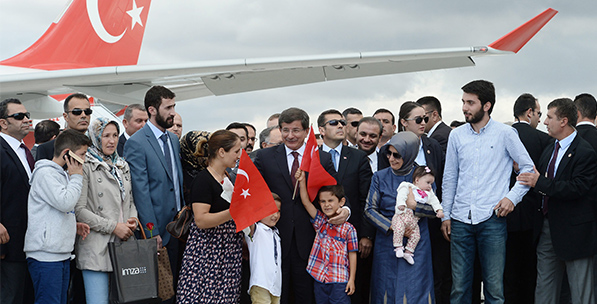Blame Turkey' Frustration of Anonymous Us Officials
U.S. officials are eager to point their fingers at Turkey and blame Ankara for its inaction in the crisis in Kobani.
More


Kobani: A City on Fire
The recent clashes around Kobani are once more demonstrating that the military airstrikes by the international coalition will not be sufficient to eradicate the ISIS from the region without a comprehensive strategy to resolve the crisis in Syria and Iraq at the same time.
More
The Kurdish political movements in both Syria and Turkey should give up being pragmatists in order to have pragmatic gains. The Kurdish political movements should also give up being opportunists in order to benefit from the opportunities in the region.
Turkey wants regional players to establish a regional order in a peaceful and cooperative manner; it wants governments to reflect the sentiments of their citizens and end the conflicts in the region.
In a post-ISIS region, it is likely new radical groups claiming to wage jihad bent on shattering the Middle East's religious environment will emerge. Such radicalization in Turkey's neighborhood has become a growing threat.
Although military strikes against ISIS targets are conducted with the support of many Sunni Arab countries, this will not prove that the Sunnis in Iraq are fully supportive of these operations.
The End of Another Hostage Crisis
Forty-nine hostages were rescued from ISIS after a successful operation. Considering the delicacy of the situation, the supervision and conduct of this operation appear worthy of commendation.
More


From ISIS to Credit Ratings The Point Is to Stigmatize Turkey
Erdoğan was right when he protested Western media reports associating Turkey with ISIS and the politically motivated decisions of credit rating agencies that contradicted their approach toward similar economies.
More
Ending sectarian politics and establishing a new inclusive government in Baghdad is essential to diminishing the continuing support for the Islamic State of Iraq and al-Sham (ISIS), foreign policy expert Mehmet Özkan stresses.
First and foremost, the Abadi government will have to accumulate enough power to discourage Sunni tribes from joining ISIS fighters. The main question remains: what will happen once ISIS is defeated?
First of all, it is not clear how ISIS will be destroyed and what the projected timeframe for this operation will be.
The U.S. is seriously considering taking action against ISIS now even though the chaos in Syria and Iraq could have been avoided if the U.S. had taken action in the first place.
In this new era of Turkish politics, unsurprisingly there will be significant continuities in many public policy realms. The new government formed under the leadership of Prime Minister Ahmet Davutoğlu will continue most of the policies and projects that were started earlier.
Addressing the problem on both sides of the border would necessitate a more comprehensive strategy. The new strategy should involve actions more than PR campaigns and newspaper headlines.
However, in order to marginalize ISIS in its countries of operation a more comprehensive policy that would diminish its power and influence in Syria simultaneously with Iraq is needed.
We will see in the coming days if these operations in Iraq are some face saving measures for the Obama administration or a real attempt by the U.S. administration to start fulfilling its great power responsibilities.
How has the rebellion against the Maliki administration in Iraq started? Who are the Sunni groups other than ISIS fighting in the field? What is the ultimate goal of these groups?
Unlike in the aftermath of World War I, none but the Middle East's own children are to blame for the turmoil that the region experiences today.
Syria with the hundreds of thousands of dead and millions of refugees, has become the most significant humanitarian disasters of the recent history.
ISIL, which emerged in Iraq, did not need the Turkish border to get into Syria. Anyone who can read a map can see there is a 600 km border between Iraq and Syria. Furthermore, the political conditions that made ISIL possible have nothing to do with Turkey.
















